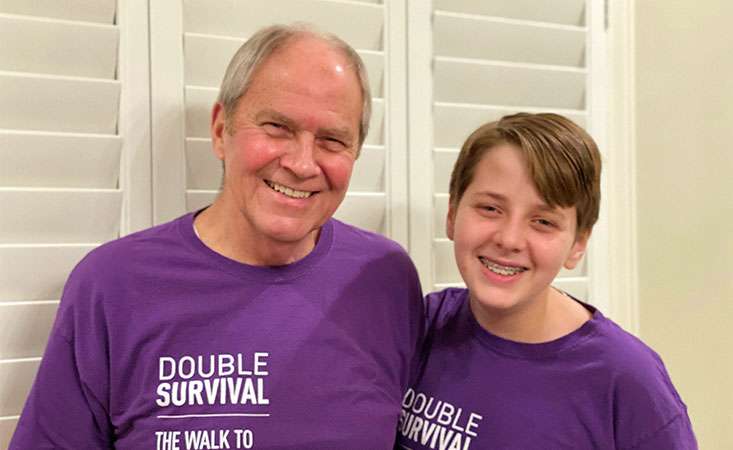
Jake Harmon, author of this article, with his grandfather Keith Jacobs – a pancreatic cancer survivor.
Editor’s note: Today, Feb. 4, is World Cancer Day, and a good reminder that our collective actions make lasting, positive change in creating a world free of cancer. This year the organizers of World Cancer Day posed the question, “Who are you, and what will you do to make an impact?” The “I am and I will” theme is about your story and your commitment to taking action in the fight against cancer.
Guest PanCAN blogger and youth supporter Jake Harmon, 14, of Louisville, Ky., answered the World Cancer Day question with, “I am supporting others and I will succeed.” Here, he offers his “10 Tips for Youth Supporters” who want to make a difference in the fight against pancreatic cancer. The tips are based on ways he has found to help his grandfather, a nearly two-year survivor. Enjoy Jake’s tips – they’re perfect for people of all ages!
I’m young. So are a lot of people. That doesn’t stop us from being affected by cancer.
Everyone’s experience is different: different types of cancers, and recovery or loss. But I think I speak for all of us when I say cancer is not good. And historically, in times of great need, we have sought unity and to feel that we’re not alone.
That’s why it’s important to share your story and hear other people’s stories, because then at least we’re not alone. So get out there and connect – I personally got involved with PanCAN and I’ve met amazing people. Connecting will help others and yourself more than you think. And that can make all the difference in the world.
Here are my tips for youth supporters who want to help, based on ways I’ve found to help my grandpa.
- Find an activity to share. Don’t discredit the older generation! They have amazing skills, some of which we’re just not being taught anymore. My grandpa and I have started doing woodworking together, and he’s teaching my sister how to drive!
- Give them remedies. Treatment can cause loss of appetite and nausea, and what tasted good last week might not taste good this week. Peppermint, ginger and fresh pineapple are my grandpa’s favorites.
- Know their story. Share daily or weekly activities with each other. Encourage story sharing. I learned that my grandpa had to walk uphill to school both ways when he was a kid.
- Talk together. Cancer can be tiring, but a good conversation can set someone at ease. It’s also less tiring than other activities, such as walking or going somewhere.
- Talk about your interests. I’m into technology. My grandpa likes engineering. Neither of us know much about the other’s interest. It can be fun to hear about what someone enjoys and why.
- Do research. Don’t just research pancreatic cancer, but research the person who has it, too. Ask them continually (every two weeks or so, at a minimum) how they feel. This will help you pick the things to do and the remedies to choose for the one you love.
- Go to treatment (if the treatment center allows it). Some infusions can be several hours long, and the time passes more quickly if you’re not alone.
- Learn about cancer and the pancreas. Cancer can be scary but knowing the facts about it can make it less overwhelming. It also helps to know what the pancreas does and how important it is for digestion. I had to explain how the pancreas works to my grandpa!
- Stay in touch. Cancer can be lonely. Take time to make a phone call or send a text. Jokes are great! It’s even better if you can stay consistent.
- Get involved. Volunteer for your local PanCAN Affiliate and participate in PurpleStride. I recently finished my second PurpleStride Louisville as Team Captain for Team Big Jake, and so far, I’ve raised over $8,000 for PanCAN.














